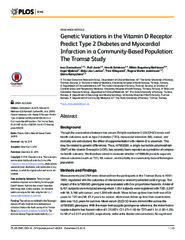| dc.description.abstract | Background
Though the associations between low serum 25-hydroxyvitamin D (25(OH)D) levels and
health outcomes such as type 2 diabetes (T2D), myocardial infarction (MI), cancer, and
mortality are well-studied, the effect of supplementation with vitamin D is uncertain. This
may be related to genetic differences. Thus, rs7968585, a single nucleotide polymorphism
(SNP) of the vitamin D receptor (VDR), has recently been reported as a predictor of composite
health outcome. We therefore aimed to evaluate whether rs7968585 predicts separate
clinical outcomes such as T2D, MI, cancer, and mortality in a community-based Norwegian
population.
Methods and Findings
Measurements and DNA were obtained from the participants in the Tromsø Study in 1994–
1995, registered with the outcomes of interest and a randomly selected control group. The
impact of the rs7968585 genotypes was evaluated with Cox proportional hazards. A total of
8,461 subjects were included among whom 1,054 subjects were registered with T2D, 2,287
with MI, 3,166 with cancer, and 4,336 with death. Mean follow-up time from birth was 60.8
years for T2D and MI, 61.2 years for cancer, while mean follow-up time from examination
date was 16.5 years for survival. Mean serum 25(OH)D levels did not differ across the
rs7968585 genotypes. With the major homozygote genotype as reference, the minor homozygote
subjects had hazard ratios of 1.25 (95% CI 1.05–1.49) for T2D and 1.14 (1.02–1.28)
for MI (P = 0.011 and 0.023, respectively, without the Bonferroni correction). No significant interaction between serum 25(OH)D status and the rs7968585 genotype was found for any
of the endpoints.
Conclusions
The VDR-related SNP rs7968585 minor allele is a significant and positive predictor for T2D
and possibly for MI. Since the functional mechanism of this SNP is not yet understood, and
the association with T2D is reported for the first time, confirmatory studies are needed. | en_US |


 English
English norsk
norsk